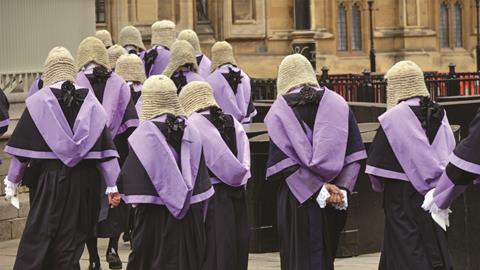A longstanding pensions row between the government and more than 200 judges, which has been linked to poor morale within the judiciary, may not be fully resolved until next year if the lord chancellor persuades the Court of Appeal to overturn an employment tribunal ruling.
Earlier this year the Employment Appeal Tribunal dismissed the government's challenge to an Employment Tribunal ruling that its transitional pension provisions for judges amounted to unlawful age discrimination. The government has now taken its challenge to the appeal court, which began hearing submissions yesterday.
The appeals concern complaints of age discrimination brought by judges who were compulsorily transferred on 1 April 2015 to new pension schemes as a result of wider public sector pension reforms. The new schemes included transitional provisions which protected workers, including judges, who were closer to retirement, from either all or some of the effects of the changes.
The first day of what is expected to be a week-long Court of Appeal hearing began with the government's barrister, John Cavanagh QC, of 11KBW, explaining to Lord Justice Longmore, Sir Colin Rimer and Sir Patrick Elias that there are 'a lot of balls in the air in this litigation'.
Cavanagh told the court that the Employment Tribunal 'should have afforded the Ministry of Justice a wider margin of discretion in relation to means [of achieving a legitimate aim]', made an 'error of law' in failing to do so, and that the Employment Appeal Tribunal should have allowed the government's challenge.
Even if the government is wrong about the margin of discretion, Cavanagh said the Employment Tribunal made a 'number of egregious errors' in its analysis of proportionate means to achieving a legitimate aim.
Cavanagh told the Court of Appeal that it should 'substitute' the tribunal's ruling. Alternatively, the matter of proportionate means should be remitted to another tribunal for a rehearing. Should fresh hearings be ordered, counsel for the judges want the case to be heard before judge Stuart Williams, who heard the Employment Tribunal challenge in 2016. However, the government wants a different judge to hear the case.
The appeal court was told that this week's hearing 'is not a challenge to the very vexed issue of the tax status of the pension scheme'.
Cavanagh said the transitional arrangements were not put in place to save money or achieve any operational or business objective: 'It was done because of a sense of moral responsibility to those closest towards retirement and a political judgement about what was achievable. It was a value judgement, a social policy choice involving political considerations as to what would be considered to be a fair and appropriate way to deal with those affected by the pension changes.'
The appeal court heard that the transitional arrangements were considered at cabinet level. Cavanagh said: 'It is not in dispute that funding for transitional protection was extra money. Peter was not robbed to pay Paul. The provision of transitional protection for those closest to retirement did not come at a financial cost to those further away to retirement.'
Cavanagh pointed out that transitional protections did not feature in the Independent Public Services Pension Commission's review of public sector pensions - led by Lord Hutton - which recommended wholesale reform.
Discussing non-discriminatory alternatives, Cavanagh said: 'If you give some transitional protection to all judges, you will not be protecting those closes to retirement. If you give no transitional protection at all, you would not be protecting those closest to retirement because you would not be protecting anyone.'
Today's hearing began with submissions from Outer Temple Chambers' Andrew Short QC (instructed by Leigh Day), who is representing over 200 judges, followed by Blackstone Chambers' Michael Beloff QC (instructed by Bindmans), who is representing six High Court judges. The appeal has been joined to a case involving 5,000 firefighters over their transitional pension protections.




























4 Readers' comments